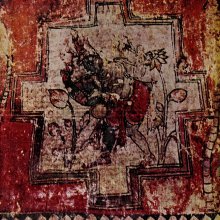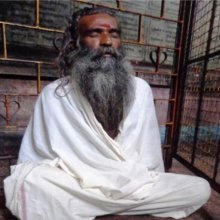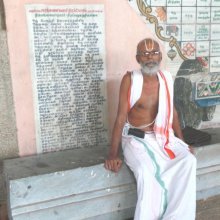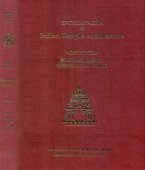Kanci, Kāñci, Kāñcī, Kañcī, Kamci, Kāṃcī: 40 definitions
Introduction:
Kanci means something in Buddhism, Pali, Hinduism, Sanskrit, the history of ancient India, Marathi, Jainism, Prakrit, biology, Tamil. If you want to know the exact meaning, history, etymology or English translation of this term then check out the descriptions on this page. Add your comment or reference to a book if you want to contribute to this summary article.
Kanci has 39 English definitions available.
Alternative spellings of this word include Kanchi.
Images (photo gallery)
Languages of India and abroad
Sanskrit dictionary
[Deutsch Wörterbuch]
Source: Cologne Digital Sanskrit Dictionaries: Böhtlingk and Roth Grosses Petersburger WörterbuchKāñci (काञ्चि):—
1) m. pl. Nomen proprium eines Volkes [Mahābhārata 1, 6684.] —
2) f. = kāñcī Gürtel [Uṇādikoṣa im Śabdakalpadruma]
--- OR ---
Kāñcī (काञ्ची):—f.
1) Gürtel, insbes. ein weiblicher mit Glöckchen oder andern klingenden Zierathen [Amarakoṣa 2, 6, 3, 10. 3, 4, 24, 160.] [Hemacandra’s Abhidhānacintāmaṇi 664.] [Anekārthasaṃgraha 2, 57.] [Medinīkoṣa c. 3.] [Rāmāyaṇa 3, 58, 26.] kāñcīninada [5, 10, 12. 12, 44.] [Suśruta 2, 423, 9.] [Raghuvaṃśa 6, 43.] [Kumārasaṃbhava 1, 37. 3, 55.] [Meghadūta 29.] [Amaruśataka 18. 28.] [Ṛtusaṃhāra 6, 4.] [Bhāgavatapurāṇa 3, 23, 32.] kāñcīkalāpa [4, 8, 49.] [Bhartṛhari 1, 56. 66.] Am Ende eines adv. comp. kāñci [Śiśupālavadha 9, 82.] —
2) Name eines Strauchs, Abrus precatorius, [Hemacandra’s Anekārthasaṃgraha] [VIŚVA im Śabdakalpadruma] —
3) Nomen proprium einer der 7 heiligen Städte [Trikāṇḍaśeṣa 3, 3, 75.] [Hemacandra’s Anekārthasaṃgraha] [Medinīkoṣa] [Varāhamihira’s Bṛhajjātaka S. 14, 15] in [Weber’s Verzeichniss 241.] kāñcīpura [Pāṇini’s acht Bücher 6, 2, 99,] [Scholiast] [Lassen’s Indische Alterthumskunde I, 165. II, 955.]
--- OR ---
Kāñci (काञ्चि):—
2) [UJJVAL.] zu [Uṇādisūtra 4, 117.] samādadhe kāñcim [ABHINANDA] ebend.
--- OR ---
Kāñcī (काञ्ची):—
3) [Bhāgavatapurāṇa 10, 79, 14.] [KṢITĪŚ. 25, 1. 41, 2. 56, 15.] [HALL 167.] [WILSON, Sel. Works 1, 28. 36. 279. 334] (an den beiden ersten Stellen kāñci) . [Oxforder Handschriften 69,a,28. 258,a,24.] pura [83,b,39.] purī [16,b,13.] nagara [251,b,26.] kṣetra [257,b,35.] maṇḍala [150,a, No. 319.] pura [HALL 203.]
--- OR ---
Kāñci (काञ्चि):—
1) ed. Bomb. liest kāṃścicchabarāṃścaiva st. kāñcīñcharabhāṃścaiva .
Source: Cologne Digital Sanskrit Dictionaries: Sanskrit-Wörterbuch in kürzerer FassungKāñci (काञ्चि):——
1) m. Pl. Nomen proprium eines Volkes. —
2) f. = kāñcī 1). Auch am Ende eines adv. Comp.
--- OR ---
Kāñcī (काञ्ची):—f. —
1) Gürtel , insbes. ein weiblicher mit Glöckchen und andern Zieraten. —
2) *Abrus precatorius. —
3) Nomen proprium einer der 7 heiligen Städte. Auch nagara , pura und purī.
Sanskrit, also spelled संस्कृतम् (saṃskṛtam), is an ancient language of India commonly seen as the grandmother of the Indo-European language family (even English!). Closely allied with Prakrit and Pali, Sanskrit is more exhaustive in both grammar and terms and has the most extensive collection of literature in the world, greatly surpassing its sister-languages Greek and Latin.
See also (Relevant definitions)
Starts with (+53): Kamciga, Kamcihasu, Kamcihullu, Kamcike, Kamcile, Kamcimeke, Kamcimogge, Kamcinamaralu, Kamcini, Kamcinimbe, Kamcipattike, Kamciraya, Kamcisimbu, Kamcita, Kamcitorana, Kamcivala, Kanchipuranam, Kanci-mariayi, Kanci-tannirkutittal, Kancidama.
Ends with (+17): Ancikkanci, Arukanci, Bettakamci, Citakanci, Cittiraikkanci, Cutukanci, Gaurikanci, Kadukamci, Kakanci, Kalakamci, Korakamci, Mancatkanci, Mannaikkanci, Maturaikkanci, Muralkanci, Mutukanci, Mutumolikkanci, Nelakamci, Paruppukkanci, Payarrankanci.
Full-text (+279): Kancipura, Kancipuri, Kancikalapa, Kancipada, Shivakanci, Kanchi, Nci, Tilakanci, Kanciyamaka, Kanjika, Kancipuraka, Vatikanci, Kancikkati, Cutukanci, Kanci-tannirkutittal, Hastigiri, Payarrankanci, Kancittelivu, Vishnukanci, Porikkanci.
Relevant text
Search found 83 books and stories containing Kanci, Kāñci, Kāñcī, Kañcī, Kamci, Kaṃci, Kañci, Kaṃcī, Kāṃci, Kānci, Kanchi, Kaanchi, Kanch, Kanji, Kāṃcī; (plurals include: Kancis, Kāñcis, Kāñcīs, Kañcīs, Kamcis, Kaṃcis, Kañcis, Kaṃcīs, Kāṃcis, Kāncis, Kanchis, Kaanchis, Kanches, Kanjis, Kāṃcīs). You can also click to the full overview containing English textual excerpts. Below are direct links for the most relevant articles:
Garga Samhita (English) (by Danavir Goswami)
Verse 2.7.26 < [Chapter 7 - Kidnapping of the Calves and Cowherd Boys]
Verse 4.19.26 < [Chapter 19 - A Thousand Names of Srī Yamunā]
Verse 4.19.3b < [Chapter 19 - A Thousand Names of Srī Yamunā]
Hanuman Nataka (critical study) (by Nurima Yeasmin)
6. Dress and Decoration < [Chapter 5]
Sahitya-kaumudi by Baladeva Vidyabhushana (by Gaurapada Dāsa)
Text 7.113 < [Chapter 7 - Literary Faults]
Text 10.23 < [Chapter 10 - Ornaments of Meaning]
Puranic encyclopaedia (by Vettam Mani)
The Religion and Philosophy of Tevaram (Thevaram) (by M. A. Dorai Rangaswamy)
Nayanar 47: Aiyadigal Kadavarkon (Aiyatikal Katavarkon) < [Volume 4.1.1 - A comparative study of the Shaivite saints the Thiruthondathogai]
Nayanar 34: Sakkiya (Cakkiya) < [Volume 4.1.1 - A comparative study of the Shaivite saints the Thiruthondathogai]
Chapter 71 - Tiruvekampam (Hymn 61) < [Volume 3.6 - Pilgrim’s progress: away from Otriyur and Cankili]
Bhagavatpadabhyudaya by Lakshmana Suri (study) (by Lathika M. P.)
Place of Samādhi—Another Point of Dispute < [Chapter 4 - Similarities and Dissimilarities]
Śaṅkaradigvijaya (list of available works) < [Chapter 4 - Similarities and Dissimilarities]
Tāntric Measures < [Chapter 3 - References to Śaṅkara’s Philosophy]
Related products
(+1 more products available)








